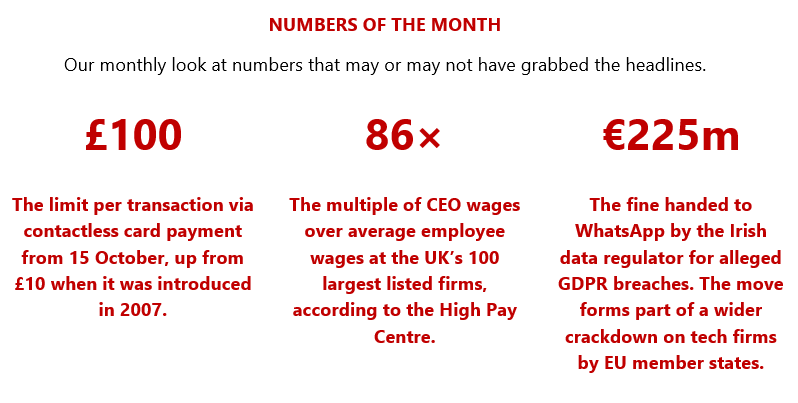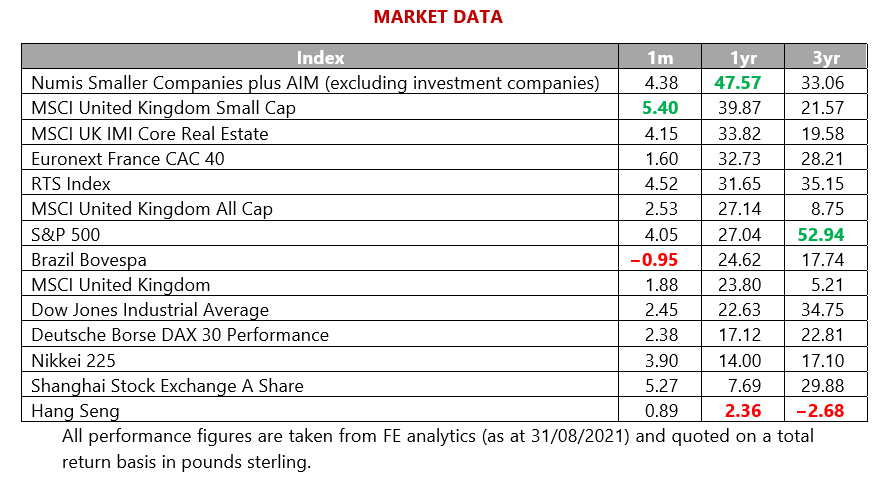United Kingdom - September 2021
Our theme this month is longevity. A long life, permanence, durability. All good things, in the main … though we could all do with the opposite as regards Covid-19, couldn’t we? Longevity when it comes to us as individuals is important – the likelihood of a working person reaching normal state pension age (even as the latter has been extended from age 60/65 a few years ago to 66, with a further increase to 67 between 2026 and 2028 and a possible future increase to 68 for those young enough) has grown significantly in the last century. Have people’s expectations done the same?
Having enough money is good, and more than enough is too; having not quite enough … that’s a problem. So now we need to consider the longevity of our finances not just ourselves. Financial planning combined (ideally integrated) with asset management enables the consideration of our feelings and goals, our aspirations, personal circumstances, etc. alongside numbers – ‘what will I need’ is more important than ‘what do I need’ now, isn’t it? That very point, ‘looking back’, is often what holds us back. Nostalgia.
When does nostalgia kick in? Well, it seems that it can be any age, though those aged in their 20s are just as likely to be nostalgic as those much older. Sound and vision tend to be the triggers – music heard between the ages of 12 and 22 is apparently most likely to be things we feel nostalgic for, and here is the connection with investing. Almost everything, despite (appropriate) regulatory warnings, is about looking back – what did we have, how did it do, why did that happen … and yet the longevity mentioned above absolutely demands we look ahead, from now – we certainly cannot change our investing past.
That is where we are with UK equities – they have really underperformed against global equities and looking back it is a long time since we saw outperformance, at least among the large-cap names. We can be nostalgic, yes, but we would have to have long memories. Instead, we concentrate on what we can see today, how we expect performance to be looking well ahead, whether there is value, and whether the values we maintain (as analysts/researchers and managers) can be met. Increasingly, taking a longer-term view, we see excellent value closer to home. We do still prefer smaller companies, but higher up the scale; we are now more willing to buy.
Away from our theme, we are nostalgic for some short-term certainty. Apart from interest rates (see later), what else do we really know – tax allowances will be frozen for several years, it will rain, Sarah Storey will win a gold medal (or three) … things will change. Of course, it is true that we never have absolute certainty for the long term as investors. However, it does feel as if we have rather less to be sure of than usual. That’s actually quite a healthy environment in which to invest.
Term or word(s) to watch: COP26 – not a very, very late sequel to 1987’s Robocop … in fact, the shorthand for a vital meeting, scheduled for Glasgow in late October/early November, the 26th UN Climate Change Conference. COP21 was in Paris, and the Paris Agreement/Accord, which is a legally binding agreement on climate change, has made its own headlines in recent years – will we be speaking about something similar from Glasgow?
It is possible – we have never seen such a co-ordinated response from governments internationally – perhaps for the very first time, all are looking at the same issues. Yes, there will be differences on how to deal with these issues, but the weight of desire leading to a weight of money to deliver action on plans suggests a tipping point. It is just one reason we are so keen on looking closer at how responsible companies are being, which in turn is having an impact on how and where we invest.
North America - September 2021
US equities notched record highs in August. Investors fretting over the possibility of tighter monetary policy from the Federal Reserve (Fed) had their fears allayed by Chair Jerome Powell, who struck a more cautious tone in his address at the annual Jackson Hole symposium. The Fed has been consistent in their message that they are keen to see further progress in the labour market before beginning to wind down the current asset purchasing programme. While there is an acknowledgement that this policy cannot continue indefinitely, it is clear the view remains that tapering too aggressively could derail progress at a sensitive time.
The recent non-farm payroll data underscored the fragility of the economic recovery. The US economy added just 235,000 jobs in August, a sharp drop from preceding months, and well below economists’ expectations of a gain of 725,000 jobs. The majority of August job increases came from gains in professional and business services, transportation and warehousing, private education and manufacturing, while retail and leisure and hospitality employment declined over the month.
It looks likely that this is a response to weakening demand for those services reflecting the insidious effect that the Covid-19 Delta variant is having on consumer activity. Although few states have reimposed restrictions beyond mask mandates, the Delta variant is nevertheless weighing on activity by spooking consumers.
The variant has surged in the US. In Alabama, Florida, Louisiana, Mississippi, Oregon and Washington, new admissions of Covid-19 patients are at the highest levels since the very start of the pandemic. Vaccine hesitancy has been a painful thorn in the side of the Biden administration since the approval of the vaccine.
Covid-19 vaccines continue to be controversial and politicised in the US. Some well-known conservative media figures have taken to using their extensive platforms to fuel conspiracy theories and spread misinformation. Despite this, vaccination rates did rise in August in part thanks to vaccine mandates by governments, schools and businesses.
The disappointing economic data as well as dovish comments from Fed Chairman Powell put further pressure on the US dollar with the Dollar Index falling in 10 of the last 11 days (as at 6/9/21). US markets, however, have remained resilient following strong earnings reports from a broad spread of sectors. Financials performed well following robust revenues for major investment banks that returned to (and some even surpassed) pre-pandemic levels. There also seems to be no stopping technology companies and communications services with giants such as Google parent Alphabet, Facebook and Netflix emerging as some of the summer’s strongest performers.
Given the wealth of options streaming services provide, these days it is a challenge to find a scripted television series that achieves a stay of execution for as many as four seasons. This makes The Simpsons’ 32 season streak the longest running US series even more impressive. The iconic series, which is a satirical depiction of US life, has amassed worldwide recognition, spawned countless catchphrases and even been (somewhat tenuously) accredited for predicting some major world events.
Our exposure to US equities remains tilted to areas where we see potential for long-term growth. We continue to favour infrastructure, healthcare, technology and non-life insurance.
Europe - September 2021
Eurozone inflation came in at around 3% in August and although the European Central Bank (ECB) has indicated rates won’t move until inflation is ‘durably’ above 2%, this certainly represents a shift in outlook. Indeed, it constitutes a decade-high figure with energy price rises accounting for a significant part of the output. Of course, there is the possibility that this will prove transitory, but it almost looks like an achievement in a continent with so much accumulated debt and where the risk of deflation has existed for some time.
Still, one has to be careful what one wishes for. There will be pressure on ECB members to act if the trend is persistent and it is likely that upgraded inflation forecasts will lead to a relaxation in the rate of bond purchases by the central bank. Of course, to the degree that higher growth is driving some of the uptick in inflation data this is reasonable news for equities, though it will create some nervousness and the actions of policy makers have been crucial to market performance since the financial crisis.
It is also likely to cause tensions between hawkish members of the ECB and their more dovish counterparts.
On the topic of longevity, one of the arguments against Europe has always been its generally unappealing demographics. The population is aging such that the ratio between workers and those being supported by the taxation system looks unattractive. Other geographies have always looked significantly better on this basis and within developed markets alone the US has seemed better placed. Recently, that dynamic has shifted with the gap less stark than it was – perhaps another argument in Europe’s favour.
Some of the data on the spread of the Delta variant is as concerning here as it is elsewhere and the World Health Organisation has expressed its opinion over the falling vaccination rate. Travel restrictions have started to increase again, and the important questions are suddenly related to how the various geographies can withstand another spike in infections and the consequent measures to curtail them. On this front, developed markets look much better placed than their emerging market peers, which is another tick in the box (at least in a relative sense) for Europe.
At this stage, Europe does seem to have more to gain than most peers and our recently increased positions look more than justified.
Japan - September 2021
Political dissatisfaction over the handling of Covid-19 as well as the (relative) damp squib of the Olympics has taken their toll on Japan’s Prime Minister, Yoshihide Suga. Indeed, Prime Minister Suga surprised the country on 3 September by announcing he would not be standing in the Liberal Democratic Party (LDP) leadership race, effectively stepping down after just a year.
Somewhat ironically, given our theme of longevity this month, it has left investors questioning whether we move back to a period of more unsettled politics and the rotating premiership we saw in the years before Japan’s brief flirtation with sticking with a leader for a decent period when Shinzo Abe took power in 2012 for an extended period.
Markets have had an initially positive response to the news, with the Nikkei up around 2% on the announcement. Hopes that a new leader might bring the prospect of greater stimulus, as well as improving the party’s chances at the upcoming general election, have led to investor optimism.
Suga’s popularity fell significantly in recent months, in part due to the impact of the inconsistency of the Covid-19 response and sluggish vaccine rollout that has left many cities still in a state of emergency.
The ruling LDP faces a general election at the end of November – at this stage it seems unlikely that other parties will be able to mount a sufficient challenge to whoever takes over from Suga. While a new PM might usher in greater stimulus, it is unlikely that his successor will rip up current policies. Although elections always bring about the potential for some political volatility short term, we should not expect to see the end of Abenomics anytime soon. Indeed, several of the contenders within the LDP appear to be more supportive of increased government support for the economy and markets.
It is clear that Japan’s recovery remains much slower than has been seen in other advanced economies like the US, so the continuation of loose economic and fiscal policy is seen as good news. At the same time, a spike in cases of the Delta variant in other parts of Asia has further disrupted supply chains for some Japanese manufacturers, which could hurt factory output and threaten the already fragile recovery.
The Okinawa diet describes the eating habits of the indigenous people of the Ryukyu Islands (belonging to Japan), which is believed to contribute to their exceptional longevity. The diet is comprised of very nutritious mostly plant-based foods — especially sweet potatoes – and is fairly restrictive given Okinawa’s relative isolation and island geography.
Although the region is still suffering from the global shock of the Covid-19 virus, we continue to believe that there are some exceptional companies within Japan. Valuations are not challenging compared to those of most peers and we could see momentum strengthen following the election.
Asia Pacific - September 2021
Fears over China’s intervention in markets persist, but the appeal of the rest of Asia seems largely undiluted. Opportunities are abound across the geography and we have considered many ideas including Vietnam. This market faces the challenges inherent within many emerging/frontier markets, but it seems well placed to grow possibly even at China’s expense as it is primed to take an increasing share of the global supply chain.
Vietnam has a fundamentally entrepreneurial culture and although the government is communist in nature, growth has been rapid. Yes, valuations are an issue for some – price to book value on the market is undeniably high though average for Vietnam’s typical range – but some investment vehicles are now trading at discounts to Net Asset Value, which makes them more interesting. Vietnam also holds out the possibility that it will receive an upgrade to emerging market status (from frontier, having missed out in September), which would attract a new, deeper pool of investment capital.
Political tensions in the South China Sea would clearly upset sentiment, but the possibility of close to 7% GDP growth is likely to be tempting for many. The country has also had a relatively miraculous escape from the worst of the fallout from Covid-19 (though some concerns have surfaced very recently), which bodes well if we see a sustained uptick in infection rates elsewhere.
As one would expect from such a diverse region, life expectancy varies hugely across Asia. Japan, Singapore and South Korea lead the way on this front, all recording figures above 82 years, with India some 15 years behind and Afghanistan, perhaps predictably, having the lowest life expectancy across the continent.
The Asian consumer and growth of the middle class is such a strong long-term trend in its own right that significant allocations to the region seem justified on a general basis. This doesn’t mean that ideas won’t come along that merit consideration, even if they are of a more nuanced nature (we do this with China and India in the emerging markets space already). Vietnam may well be one we look at in greater detail at some stage as part of our ongoing attempts to add value to portfolios.
Emerging Markets - September 2021
As we mention earlier, fears over Chinese intervention continue to swirl. In August, it was gaming that was in the crosshairs, with new regulations stating that under-18s will only be allowed to play online between 8 pm and 9 pm on Fridays, Saturdays, Sundays and holidays. According to Chinese state media, the decision helps to protect the mental and physical health of minors. For foreign investors, these apparently draconian rules serve as yet another stern reminder of the power wielded by the ruling Communist Party.
Unsurprisingly, shares of Chinese gaming giants Tencent and NetEase fell on the news, in a continuation of a strong downward trajectory since February. Indeed, Tencent appears to have legislated for the tougher stance from Beijing. In the first six months of 2021, the firm struck 16 deals in Europe, a record number, and a total of 34 international investments. For context, overseas deals totalled three and four in 2019 and 2020 respectively.
The move comes after billions were wiped from Chinese education companies, following the suggestion that Beijing might ban tutors from making profits. The heavy workload combined with the financial burden of funding extra-curricular classes were cited as key concerns, as was the potential social disparity that tutoring may cause. Many believe the associated costs of trying to get ahead in modern day Chinese society are leading to declining birth rates, something the Party is keen to address.
Longevity is something that President Xi Jingping specialises in. In 2018, it was announced that the two-term limit on Presidency was to be removed, allowing the incumbent to remain in power for life.
We retain allocations to China for now, keeping a watchful eye over developments. We continue to believe that the market offers value and its long-term appeal remains, but we are prepared to change our minds if appropriate.
Spotlight on Insurance - September 2021
Insurance is a theme that we have had in portfolios for some time now and it is one that we continue to believe offers long-term value. Readers will need no reminder that insurance is not a discretionary purchase in many areas of life, indeed it is often required by law. This can make it less sensitive to macroeconomic conditions and can offer investors more defensive equity exposure. Even non-discretionary insurance can offer stable and recurring revenue profiles, given its use as a risk management tool for so many consumers and businesses.
A key skill that insurers need to possess is the ability to estimate what future claims might look like and setting premiums at a competitive level, while ensuring that the pool of premiums will cover claims and leave profits for shareholders. Returns for shareholders are not simply reliant on the level of premiums received over a period. The premiums are invested in various assets prior to being paid out (or not) and this concept is known as ‘the float’.
The composition of assets that an insurer invests in between receiving the premium and any potential claim differs according to the time horizons involved. For property and casualty insurers, premiums need to remain readily available and in liquid instruments, owing to the short-term nature of the policies and the likelihood of claims arising in day-to-day life. This differs from life insurers, who benefit from much longer time horizons and the ability to invest in less liquid and potentially higher return assets.
Major disasters have a mixed impact on insurers. Covid-19 was initially a significant cause for concern for investors, specifically the potential for significant business interruption claims from policyholders. In the US, policy language is clear in excluding pandemics and retroactive changes to those contracts seem unlikely.
Natural disasters are covered in many policies and can lead to significant losses for the insurer. However, longer term, major events can lead to higher premiums and a greater desire by consumers and business to insure risks.
Longevity is something that actuaries at life insurance companies spend a great deal of time thinking about. Mortality tables provide a list of ages and probabilities of survival, which can then be used as part of risk calculations. The inputs to mortality tables are extremely complex and numbers can vary significantly based on gender, location and socio-economic grouping.
We continue to believe that insurance offers a more defensive route to gaining equity exposure. Current metrics suggest a strong underwriting market and relatively low valuations and we remain comfortable with our positions for now.
Fixed Income - September 2021
The accumulation of corporate debt since the financial crisis in general, and over the last year in particular, is something we have written about extensively. With opportunities to raise debt at very low levels and the summer lull coming to an end, many companies are sensing this is a time to load up on more borrowings. Inflation may well prove to be ‘transitory’ or whatever the choice term of policy makers is at the current time, but corporates will want to make a move in case rates move higher later in the year. High yield issuers in particular are expected to be active over the coming months.
Cynics will see this as a round of fundraising where companies seek to insulate themselves from another downturn (if the Covid-19 news reverses course), but buy backs and acquisitions are likely to be high up on the agenda too. Yields are generally unexciting as they have been driven so low, but US debt continues to attract attention from overseas investors as returns are so meagre elsewhere. Returns are a bit more tempting in emerging markets though one has to be careful here. If monetary policy in the US takes a harder turn, there is significant vulnerability given the impact of a stronger dollar on local currencies.
We are monitoring all our fixed income positions closely whether it be Treasuries or corporate debt of any credit quality. Against a backdrop of potential tapering and inflation it is only natural to feel uneasy about the whole space, but we cannot overlook the diversification and breadth it can bring to portfolios.
Commodities - September 2021
Another month and another round of data suggesting that the Chinese economy is facing challenges. A number of data prints have fallen short of expectations including China’s service sector activity, retail sales and manufacturing surveys. China’s importance for the global commodities market is beyond doubt and this has naturally made investors question whether any sustained slowdown will be fatal for the performance of commodity markets. China’s crackdown on the steel industry’s polluting effects has already impacted the iron ore price.
The Bloomberg Commodity Index has made steady progress over the course of the year, but this could be a turning point. China’s imports of commodities fell pretty much across the board in July, and we may well be entering a more challenging period.
Some investors are naturally attracted to certain regions when playing the commodities space. Latin America is one such destination with rich supplies of iron ore and copper among other commodities. This example of course only serves to highlight the problems with geographical approaches to accessing underlying themes. Latin America faces significant political challenges, so the mere presence of commodity plays in the regions is far from sufficient to merit allocations – we believe Afghanistan has copious supplies of rare earth metals, essential to the green revolution, but this might not be an opportune time to begin investing in Afghan mining operations!
Well-diversified mining funds are of course a different beast entirely, though there is often a limited range of commodities that actually make it into portfolios. Most include substantial allocations to gold, and this remains our preferred play in portfolios not because of its participation in the global recovery story but as a protective asset in a world of uncertain monetary policy.
Gold has been used as a store of value for thousands of years. It seems unlikely Bitcoin will be able to claim this sort of longevity.
If inflation does become entrenched, then it is likely our commodities exposure would become more extensive and generalised, but this is an unproven thesis and our exposure remains unchanged.
Property - September 2021
Residential property is an area of the market that has been gaining increasing levels of attention from investors over recent months. In August, Lloyds Bank announced their intention to become one of the UK’s largest landlords by purchasing 50,000 homes over the next 10 years. Operating under the brand Citra Living, the bank announced that it may consider meeting its ambitious targets through M&A or strategic alliances, which pricked the ears of market participants.
Lloyds aren’t the first to signal their interest in the space. John Lewis announced in July their intention to build 10,000 rental homes over the next few years. The business is making use of its existing property portfolio, with 70% of those new homes being built on existing sites. No existing sites will be demolished as a result of the move, which could see the repurposing of car parks to build houses and existing stores converted to flats. Prospective tenants will even have the option of renting a flat furnished with John Lewis products!
John Lewis, Lloyds and others are quick to highlight the social purpose in providing housing. However, with the former making a £517m pre-tax loss this year and the latter battling record low interest rates, the move could well be driven by financial motives! Their move is potentially a shrewd one and the sector appears to offer long-term growth prospects, with so many struggling to get on the housing ladder.
Relative to other countries, the UK remains fixated with home ownership and many companies are anticipating a shift in mentality. Competition could be fierce and firms from around the world have made commitments to the sector. In June, Australian Bank Macquarie announced its Goodstone Living platform and its intention to invest £1bn into the sector.
For landlords, longevity of leases is crucial. Research by one lettings agent found that residential tenants spent 20 months at a property, on average. Regional differences were significant, with the shortest tenancies (15 months) found in the Southwest. Commuter towns tend to have longer tenancies, with Sevenoaks, Kent, boasting a 44-month average tenancy.
The private rental market is relatively difficult to access via UK stock markets, with only two vehicles on offer. It isn’t an area we have exposure to at present, but it is one we watch with interest.
Responsible Assets - September 2021
Like so many factors involved in responsible investing, looking after workers is not only morally right it also makes good business sense. In 2019, research by Oxford University’s Saïd Business School, in collaboration with BT, found that workers are 13% more productive when happy. Of course, what makes a worker happy is subjective, but generally we are seeing companies taking more affirmative actions in ensuring the wellbeing of their workforce.
In August, M&S announced that it will close all 1,000 of its UK and Ireland stores on Boxing Day this year, giving its 70,000 staff the day off to spend time with their families. Later in the month, Nike announced that it had shut down its global headquarters for a week and ordered thousands of office workers to cease their day jobs to mitigate the risk of pandemic-related burnout. The move follows similar initiatives at dating app, Bumble, and networking site, LinkedIn.
Work ethic is often culturally ingrained and can be difficult to change. A study by the US Travel Association found 55% of Americans fail to use all of their paid time off, which, as a reminder, is significantly lower than we get here in the UK. In China, the government has stepped in to ban the ‘996 work culture’ that had become prevalent in many industries.
For the uninitiated 996 refers to working from 9 am to 9 pm six days a week. The practice is reported to have caused the death of several workers and left many more out of pocket, with overtime going unpaid.=
Changing culture at a national and corporate level can be slow, but it is pleasing to see larger businesses acknowledging the benefits of physical and mental wellbeing. Surely the move towards more worker friendly practices bears no relation to the impending worker shortages in many Western economies?!
Currency - September 2021
On Paralympic medals per capita, we have one of the strongest currencies in the world. In line with our theme, when it comes to longevity, the British pound is the winner, for a currency still in use. For ‘longest’ currency, we find the 1998 Philippines 100,000 peso note, which measured a whopping 14 inches.
Hopefully this is all interesting … as we don’t have more to add this month.
UK Interest Rates - September 2021
While a little more positivity might suggest rates could be on the way up, the end of the Furlough Scheme (end of September) and worries over further Covid-19 infections following the return to school, the prevalence of the Delta variant, etc. suggest to us that the Bank of England has no scope to raise rates any time soon. The spectre of sticky inflation would be the catalyst, and on a recent call Ben Broadbent, the Deputy Governor, pointed out that the Bank would wait for proof – this alone suggests a rise is a minimum of six months away, probably more.


The Monthly Market Commentary (MMC) is written and researched by Simon Gibson, Richard Smith, Scott Bradshaw, Jonathon Marchant and Lauren Wilson for clients and professional connections of Mattioli Woods, and is for information purposes only. It is not intended to be an invitation to buy, or to act upon the comments made, and all investment decisions should be taken with advice, given appropriate knowledge of the investor’s circumstances. The value of investments and the income from them can fall as well as rise and investors may not get back the full amount invested. Past performance is not a guide to the future. Mattioli Woods is authorised and regulated by the Financial Conduct Authority.
The MMC will always be sent to you by the seventh working day of each month, usually sooner, is normally delivered via email, and is free of charge as the MMC is generally made available to clients who have assets under our management in excess of £200,000, and to all clients under our Discretionary Portfolio Management Service (DPM). Normally, the MMC costs £397 + VAT per annum. Professional advisers and their clients should contact us if they are interested in receiving a monthly copy.
Sources:
www.bbc.co.uk,
www.bloomberg.com,
Financial Express,
www.thedragonsblade.com,
www.express.co.uk,
www.pitstoppin.co.uk,
www.vr-12.com,
www.smalltalkbigresults.wordpress.com,
www.mmn.com,
www.avantida.com,
www.plazmedia.com,
www.sibcyclinenews.com,
www.viewzone.com,
www.anonw.wordpress.com.
All other sources quoted if used directly; except fund managers who will be left anonymous; otherwise, this is the work of Mattioli Woods.




